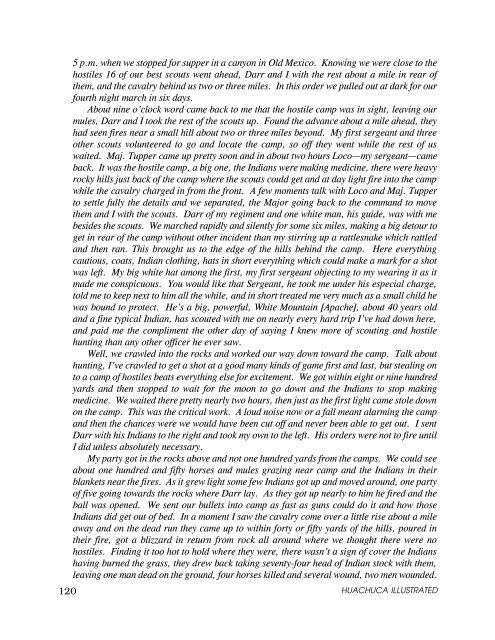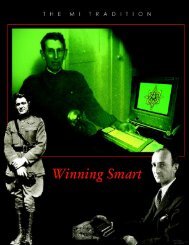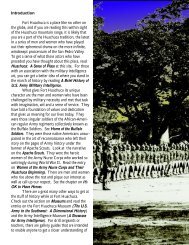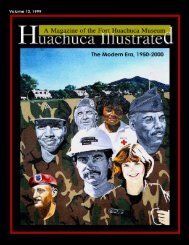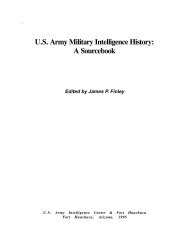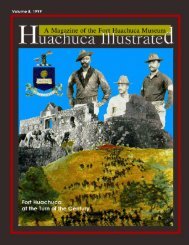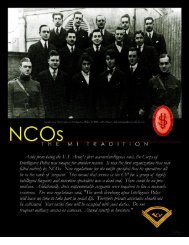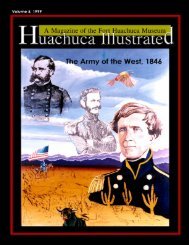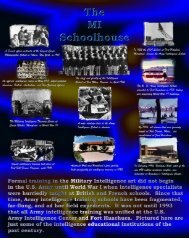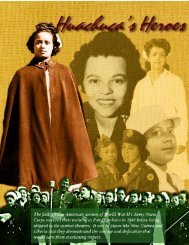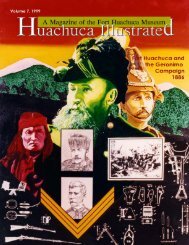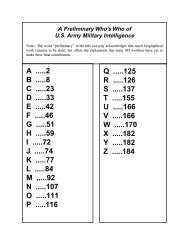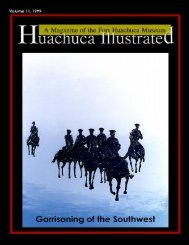Apache Campaigns - Fort Huachuca - U.S. Army
Apache Campaigns - Fort Huachuca - U.S. Army
Apache Campaigns - Fort Huachuca - U.S. Army
Create successful ePaper yourself
Turn your PDF publications into a flip-book with our unique Google optimized e-Paper software.
120<br />
5 p.m. when we stopped for supper in a canyon in Old Mexico. Knowing we were close to the<br />
hostiles 16 of our best scouts went ahead, Darr and I with the rest about a mile in rear of<br />
them, and the cavalry behind us two or three miles. In this order we pulled out at dark for our<br />
fourth night march in six days.<br />
About nine o’clock word came back to me that the hostile camp was in sight, leaving our<br />
mules, Darr and I took the rest of the scouts up. Found the advance about a mile ahead, they<br />
had seen fires near a small hill about two or three miles beyond. My first sergeant and three<br />
other scouts volunteered to go and locate the camp, so off they went while the rest of us<br />
waited. Maj. Tupper came up pretty soon and in about two hours Loco—my sergeant—came<br />
back. It was the hostile camp, a big one, the Indians were making medicine, there were heavy<br />
rocky hills just back of the camp where the scouts could get and at day light fire into the camp<br />
while the cavalry charged in from the front. A few moments talk with Loco and Maj. Tupper<br />
to settle fully the details and we separated, the Major going back to the command to move<br />
them and I with the scouts. Darr of my regiment and one white man, his guide, was with me<br />
besides the scouts. We marched rapidly and silently for some six miles, making a big detour to<br />
get in rear of the camp without other incident than my stirring up a rattlesnake which rattled<br />
and then ran. This brought us to the edge of the hills behind the camp. Here everything<br />
cautious, coats, Indian clothing, hats in short everything which could make a mark for a shot<br />
was left. My big white hat among the first, my first sergeant objecting to my wearing it as it<br />
made me conspicuous. You would like that Sergeant, he took me under his especial charge,<br />
told me to keep next to him all the while, and in short treated me very much as a small child he<br />
was bound to protect. He’s a big, powerful, White Mountain [<strong>Apache</strong>], about 40 years old<br />
and a fine typical Indian, has scouted with me on nearly every hard trip I’ve had down here,<br />
and paid me the compliment the other day of saying I knew more of scouting and hostile<br />
hunting than any other officer he ever saw.<br />
Well, we crawled into the rocks and worked our way down toward the camp. Talk about<br />
hunting, I’ve crawled to get a shot at a good many kinds of game first and last, but stealing on<br />
to a camp of hostiles beats everything else for excitement. We got within eight or nine hundred<br />
yards and then stopped to wait for the moon to go down and the Indians to stop making<br />
medicine. We waited there pretty nearly two hours, then just as the first light came stole down<br />
on the camp. This was the critical work. A loud noise now or a fall meant alarming the camp<br />
and then the chances were we would have been cut off and never been able to get out. I sent<br />
Darr with his Indians to the right and took my own to the left. His orders were not to fire until<br />
I did unless absolutely necessary.<br />
My party got in the rocks above and not one hundred yards from the camps. We could see<br />
about one hundred and fifty horses and mules grazing near camp and the Indians in their<br />
blankets near the fires. As it grew light some few Indians got up and moved around, one party<br />
of five going towards the rocks where Darr lay. As they got up nearly to him he fired and the<br />
ball was opened. We sent our bullets into camp as fast as guns could do it and how those<br />
Indians did get out of bed. In a moment I saw the cavalry come over a little rise about a mile<br />
away and on the dead run they came up to within forty or fifty yards of the hills, poured in<br />
their fire, got a blizzard in return from rock all around where we thought there were no<br />
hostiles. Finding it too hot to hold where they were, there wasn’t a sign of cover the Indians<br />
having burned the grass, they drew back taking seventy-four head of Indian stock with them,<br />
leaving one man dead on the ground, four horses killed and several wound, two men wounded.<br />
HUACHUCA ILLUSTRATED


